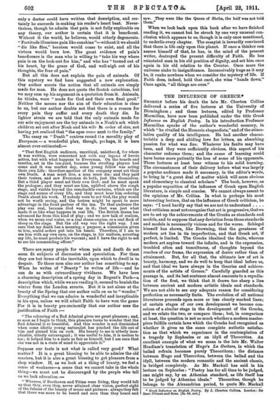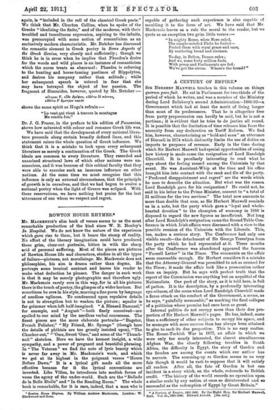THE INFLUENCE OF GREECE.* SHORTLY before his death the late
Mr. Churton Collins delivered a series of five lectures at the University of Birmingham ; and these lectures, edited by Professor Macmillan, have now been published under the title Greek Influence on English Poetry. In his introduction Professor Macmillan speaks of the author's wonderful memory, in which "he rivalled the Homeric rhapsodists," and of the stimu- lative quality of his intelligence. He had another charac- teristic a deep and abiding love for letters, an absorbing passion for what was fine. Whatever his faults may have been, and they were sufficiently obvious, this aspect of his character redeems them ; and the cause of learning could have borne more patiently the loss of some of his opponents. These lectures at least bear witness to his solid learning. The circumstances of their delivery before what was largely a popular audience made it necessary, in the editor's words, to bring in " a great deal of matter which will seem obvious and elementary to classical scholars." The book, however, as a popular exposition of the influence of Greek upon English literature, is simple and concise. We cannot always assent to the opinions of Mr. Collins. In what is perhaps his most interesting lecture, that on the influence of Greek criticism, he says : "I need hardly say that we are not to understand . . . . that criticism must not recognise that art is progressive,thatwe are to set up the achievements of the Greeks as standards and models, and to suppose that any deviation from those standards and models is necessarily vicious and for the worse. Schlegel himself has shown, like Browning, that the greatness of modern art lies in its imperfection, and that Greek art, if perfect, is limited. The Greeks idealised the finite, whereas modern art aspires toward the infinite, and is the expression, troubled often and tumultuous, of thoughts beyond the reaches of our frame, the expression of desire rather than of attainment. But, for all that, the ultimate law of art is beauty, harmony, and we do well to keep that ideal before us, and that ideal we have always in the theories and achieve- ments of the artists of Greece." Carefully guarded as this passage is, and its last sentence almost amounts to a repudia- tion of the first, we think that it draws too sharp a line between ancient and modern artistic ideals and standards. We are not able to see any adequate reason for considering perfection as necessarily finite. The evolution of all national literatures proceeds upon more or less clearly marked lines ; at certain stages of our own development we become con- scious of a similar stage in the development of the Greeks, and we relate the two, or compare them ; but, in comparison at least, the question is not so much whether a modern master- piece fulfills certain laws which the Greeks had recognised as whether it gives us the same complete msthetio satisfac- tion as that which we experience in the contemplation of a tragedy by Sophocles or an idyll of Theocritus. An excellent example of what we mean is the late Mr. Walter Headlam's translation of Hugo's La Guitars, in which the ballad refrain becomes purely Theocritean : the distance between Hugo and Theocritus, between the ballad and the idyll, between the modern romantic and the ancient classic, is bridged completely. As Mr. Mackail has said in his lecture on Sophocles : "Poetry has for all time to be judged, one might say, by an Athenian standard, as life itself has to be judged by Athenian ideals." Theocritus, though he belongs to the Alexandrian period, to quote Mr. Mackail
• Greek Influence on English Poetry. By J. Churton Collins. London : Sir 'saw: Pitman and Sons. [3s. 6d, net.] again, is "included in the roll of the classical Greek poets." We think that Mr. Churton Collins, when be spoke of the Greeks " idealising the finite," and of the moderns, with their troubled and tumultuous expression, aspiring to the infinite, was preoccupied with some notion of romanticism as an exclusively modern characteristic. Mr. Butcher has discussed the romantic element in Greek poetry in Borne Aspects of the Greek Genius, very closely and sufficiently ; though we think he is in error when he implies that Phaedra's desire for the woods and wild places is an instance of romanticism which the nurse treats as abnormal : Phaedra is referring to the hunting and horse-taming pastimes of Hippolytus, and desires his company rather than solitude ; while her subsequent speech is uttered in fear that she may have betrayed the object of her passion. The fragment of Simonides, however, quoted by Mr. Butcher :— KIXO/JAZI r, Eva€ Sp430f EZH3ITG) SE .6705, ebSiTa) ti,uerpor mccfr
shows the same spirit as Hugo's refrain :— "Le vent qui vient 1 travers la montagne Me rendra. fon."
Dr. J. G. Frazer, in the preface to his edition of Pausanias, shows how saturated with colour and romance Greek life was.
We have said that the development of every national litera- ture proceeds along certain broadly defined lines, and this statement raises the whole question of Greek influence. We think that it is a mistake to look upon every subsequent literature as merely a continuation of the Greek. The Greek ideals are common to every literature. They recorded and examined structural laws of which other nations were un- conscious, and it was because of this critical faculty that they were able to exercise such an immense influence on other nations. At the same time we must recognise that this influence is only an external circumstance, that the principle of growth is in ourselves, and that we had begun to evolve a national poetry when the light of Greece was eclipsed. With these reservations, we have nothing but praise for the last utterances of one whom we respect and regret.







































 Previous page
Previous page